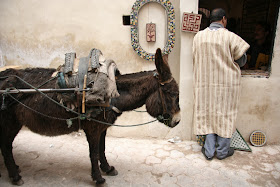There was once a wealthy farmer who owned many herds of cattle. He knew the languages of beasts and birds. In one of his stalls he kept an ox and a donkey. At the end of each day, the ox came to the place where the donkey was tied and found it well swept and watered; the manger filled with sifted straw and well-winnowed barley; and the donkey lying at his ease (for his master seldom rode him).
It chanced that one day the farmer heard the ox say to the donkey "How fortunate you are! I am worn out with toil, while you rest here in comfort. You eat well-sifted barley and lack nothing. It is only occasionally that your master rides you. As for me, my life is perpetual drudgery at the plough and the millstone." The donkey answered: "When you go out into the field and the yoke is placed upon your neck, pretend to be ill and drop down on your belly. Do not rise even if they beat you; or if you do rise, lie down again. When they take you back and place the fodder before you, do not eat it. Abstain for a day or two; and thus shall you find a rest from toil." Remember that the farmer was there and heard what passed between them.
And so when the ploughman came to the ox with his fodder, he ate scarcely any of it. And when the ploughman came the following morning to take him out into the field, the ox appeared to be far from well. Then the farmer said to the ploughman: "Take the donkey and use him at the plough all day!" The man returned, took the donkey in place of the ox, and drove him at the plough all day. When the day's work was done and the donkey returned to the stall, the ox thanked him for his good counsel. But the donkey made no reply and bitterly repented his rashness.
Next day the ploughman came and took the donkey again and made him labour till evening; so that when the donkey returned with his neck flayed by the yoke, and in a pitiful state of exhaustion, the ox again expressed his gratitude to him and praised his sagacity. "If only I had kept my wisdom to myself!" thought the donkey. Then, turning to the ox, he said: "I have just heard my master say to his servant: 'If the ox does not recover soon, take him to the slaughterhouse and dispose of him.' My anxiety for your safety prompts me, my friend, to let you know of this before it is too late. And peace be with you!" When he heard the donkey's words, the ox thanked him and said: " Tomorrow I will go to work freely and willingly." He ate all his fodder and even licked the manger clean.
Early next morning the farmer, accompanied by his wife, went to visit the ox in his stall. The ploughman came and led out the ox, who at the sight of his master broke wind and frisked about in all directions. And the farmer laughed so, he fell over on his back. From the Fable of the Donkey, the Ox and the Farmer in the Tales from the Thousand and One Nights
From the berber villages of the Rif mountains in the north all the way down to the Sahara desert in the south and all the cities and towns in between, donkeys are a fundamental part of life in Morocco. Like it or not these animals of burden are still used to transport goods and materials much as they have been for thousands of years. Mainly through ignorance and poverty many are mistreated. However in recent years various charities are popping up doing great work to change the treatment of donkeys throughout the country.
Within the ancient Medina (old walled city) of Marrakech, the derbs (streets) are too narrow for cars or trucks to access. Donkeys are therefore still the most practical way of transporting building materials, pulling small carts of goods from place to place. In a scene played out daily across the country, much as it has since biblical times, it was no surprise to see the donkeys employed by our builders to bring stocks of bricks to site at Riad Romm'an (above).






We offer top class Morocco Excursion with Morocco Travel Packages, one can always avail the opportunity inclusive of all facilities
ReplyDelete